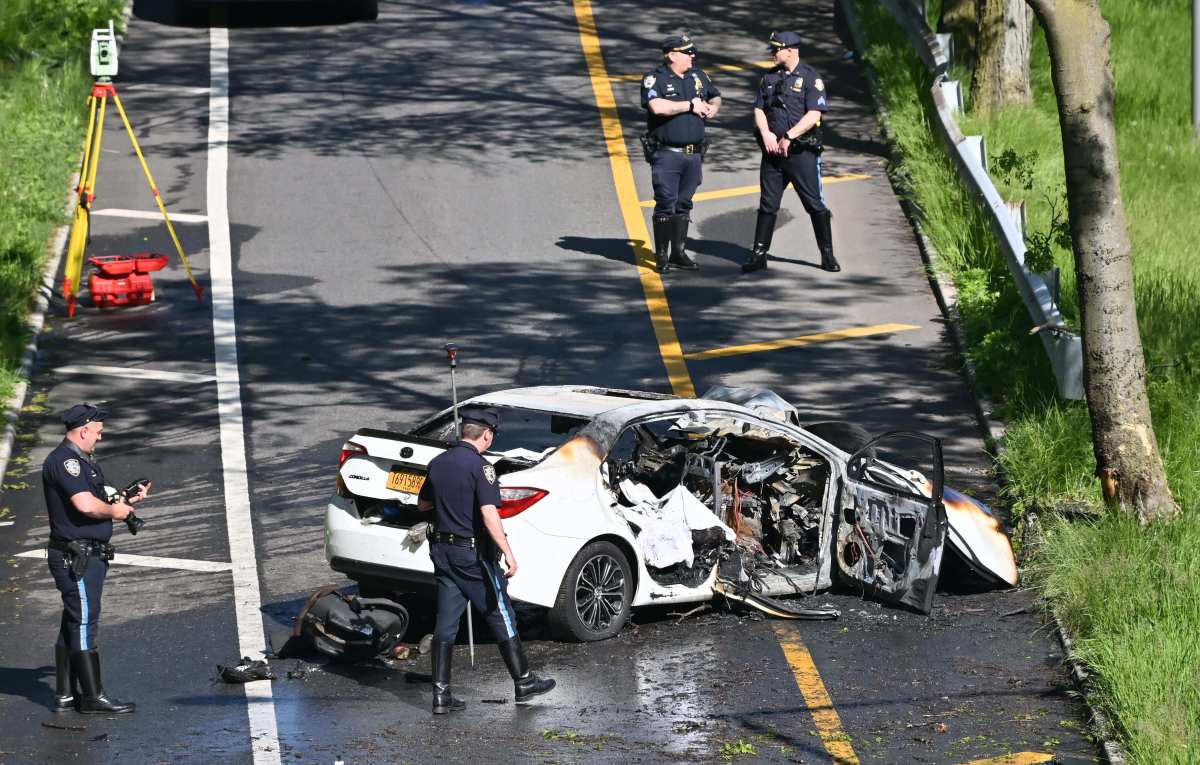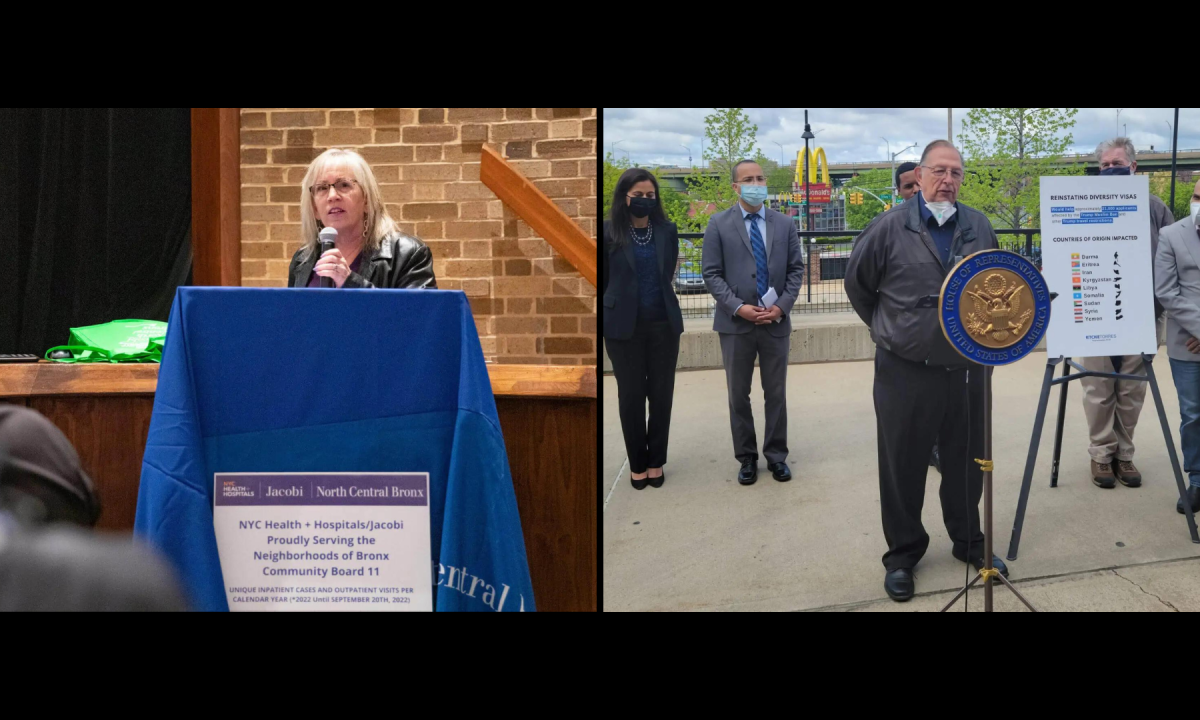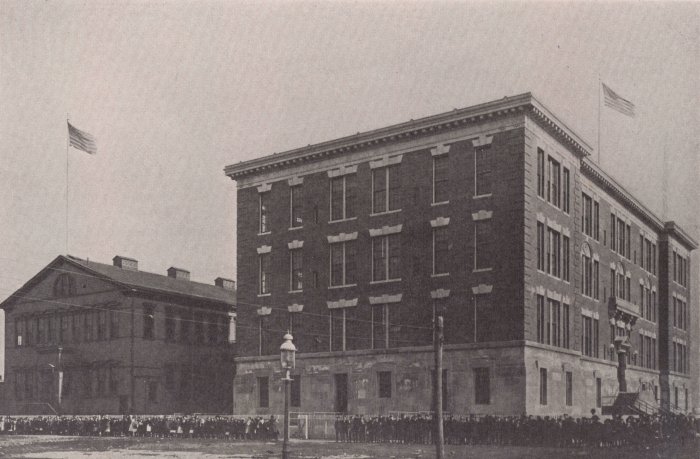Legal loopholes have allowed some of New York City’s most reckless drivers to pile up tickets, sometimes by the dozen, and stay on the road anyway — until or even after killing or injuring other New Yorkers.
This comes as the overall proliferation of speed cameras across the city in recent years appears to have reduced the incidence of speeding. Yet state law, which led to thousands of new cameras being installed and put into operation, contains a fatal flaw that winds up helping drivers avoid one layer of accountability under motor vehicle regulations.
Traditionally, being convicted of a traffic infraction accrues “points” on one’s driver’s license. Points can accrue over speeding, running a red light, failing to yield, texting and driving, and all manner of other things; if you get more than 11 points on your license within an 18-month period, the DMV can suspend your license.
Ticketing is not quite the same for the city’s 2,000 school zone speed cameras and 150 red light cameras hunting scofflaws across the city. Under the terms of state law authorizing the cameras, tickets issued from the camera footage cannot accrue points on a driver’s license — meaning the city’s most reckless motorists can accrue as many as they want and keep driving as long as they pay the $50 fine.
Despite the less stringent penalties, automated cameras are bearing more of the burden of traffic enforcement as the NYPD’s own enforcement appears to be on the decline.
Moving violation summonses in 2023 were down 35% compared to 2018, according to NYPD traffic data. 2018 saw more than a million moving violation summonses issued while 2023 saw fewer than 700,000. Summonses for speeding specifically are down 29% in the same time period.
At the same time, fatal collisions are up 30% this year compared to the same time in 2023, according to NYPD statistics. The NYPD did not respond to a request for comment.
The Department of Transportation (DOT) reported this month that drivers who accrue more than five red light violations are thrice as likely to get into a crash that results in injuries. Oftentimes when a crash is fatal, the car’s license plate is found to have a record with a large number of speed camera tickets.
Recent carnage
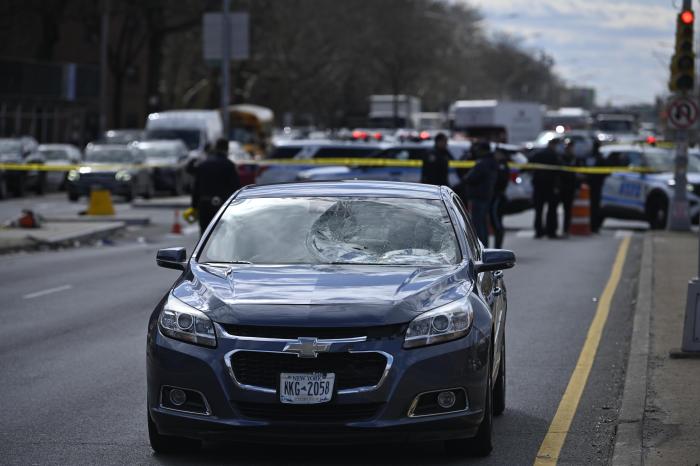
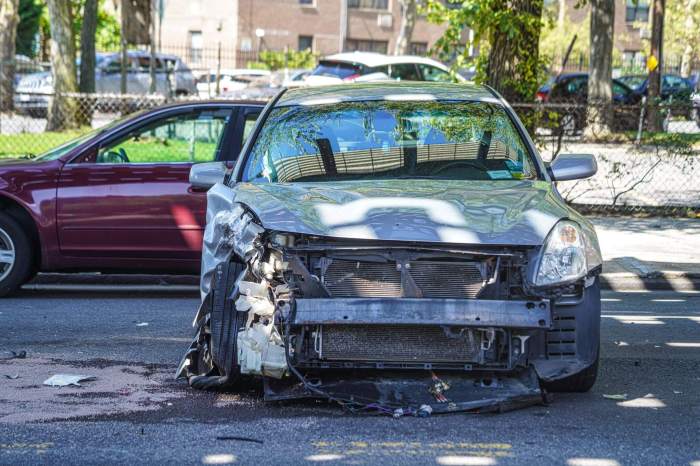
This month, 36-year-old Mark Schumaker was crossing Linden Boulevard in East New York, Brooklyn when he was struck by the driver of a Chevy sedan with such great force the car’s windshield was caved in. The driver, whose license plate had accumulated 8 speeding tickets in just the past year, was not charged with a crime.
Days earlier, a motorist with a history of arrests for unlicensed driving fatally ran over 8-year-old Bayron Palomino Arroyo in East Elmhurst, Queens and injured his 10-year-old brother as they crossed the street. While the pickup truck driver, Jose Barcia, was charged with criminally negligent homicide, he was not made to surrender his driver’s license, Streetsblog reported, despite having racked up 8 speeding tickets since last June on his North Carolina license plate.
But perhaps no incident is more illustrative than that of 3-month-old baby Apolline Mong-Guillemin.
On the evening of Sept. 11, 2021, her parents walked her in her stroller in Clinton Hill, Brooklyn; at the same time, Tyrik Mott was hitting the gas to escape cops pursuing him for running a red light. At the intersection of Gates and Vanderbilt avenues, he smashed his Honda at high speed into another car, which careened right into the infant and her parents, killing Apolline and severely injuring her mom and dad.
Mott, who would be sentenced to nine years in jail, had racked up an astounding 91 camera-issued speeding tickets on his Pennsylvania license plate between 2017 and 2021.
These incidents serve to illustrate the fatal flaws in the city’s war on speeders — something which at least one local lawmaker realizes the need to address.
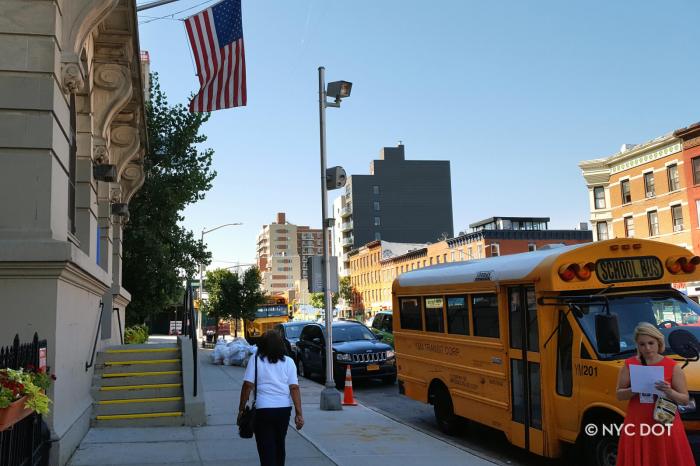
“We have no mechanism right now, under law, to crack down on extremely reckless drivers who show nothing but total disregard for traffic laws by continuously speeding and racking up 6, 7, 10, 20, 30 or more speeding tickets,” said Brooklyn State Sen. Andrew Gounardes, who has advocated for street safety measures in Albany.
Apolline’s parents have sued the city for not getting Mott off the road sooner and not designing the intersection in a way to prevent such a tragedy; lawyers for both the city and Mott have claimed they bear no responsibility for the crash because the parents should have known the inherent risks of walking down a New York City sidewalk.
A driver safety program that didn’t work
New York City did have a program intended to hold leadfoots accountable, the Dangerous Vehicle Abatement Program (DVAP). Enacted in 2020, DVAP required drivers who racked up at least 5 camera-issued red light tickets or 15 speed camera tickets in one year to enroll in a driver “accountability” course intended to demonstrate the potentially fatal consequences of their actions.
Drivers could appeal the sentence, but if an administrative judge agreed with city investigators, but the driver still failed to enroll in the course, their vehicle could be impounded.
DVAP presented the city with a way to get the Big Apple’s most reckless drivers off the road, but both the de Blasio and Adams administrations failed to implement it as its sponsor, then City Councilmember and now Comptroller Brad Lander, envisioned. It expired last year with little accomplishment to its name.
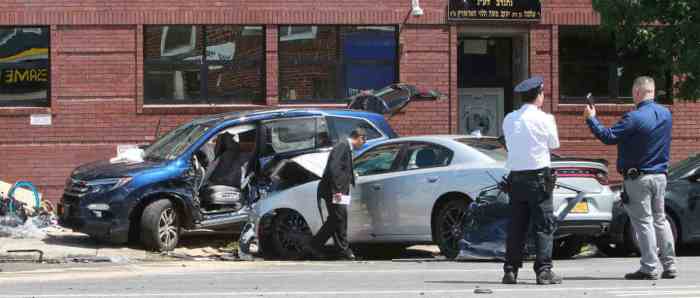
Tens of thousands of drivers were eligible for the one-time, 90-minute course, and Lander said it was intended for about 5,000 drivers per year to cycle through the class. But after 2 1/2 years, DOT had only informed 1,600 people of their requirement to take the course, Lander reported last year. Half of those drivers simply ignored the warning; the city got warrants to seize 159 scofflaws’ vehicles, but by program’s end only 12 had actually been impounded.
And it’s unclear if the course actually had any impact, as Mott himself had taken it before killing Baby Apolline. After the expiration, DOT said the program was “well-intentioned” but “ineffective at meaningfully reducing unsafe driving.”
What can be done?
Albany lawmakers have managed to greatly expand the scope of the ticket-issuing camera program, and they appear to have meaningfully reduced speeding. But efforts to limit the reckless behavior of the city’s worst drivers have stalled.
Gounardes, along with Brooklyn Assemblymember Emily Gallagher, introduced a bill last year that would require “speed governors” to be installed in all cars that accrue at least 6 speed or red light camera tickets, limiting the speed that car can travel to 5 miles per hour above the speed limit. Another bill, by Queens Senator Michael Gianaris and Syracuse Assemblymember William Magnarelli, would suspend the registration of any vehicle caught by a red light or speed camera at least five times in one year. Both bills are still languishing in committee.
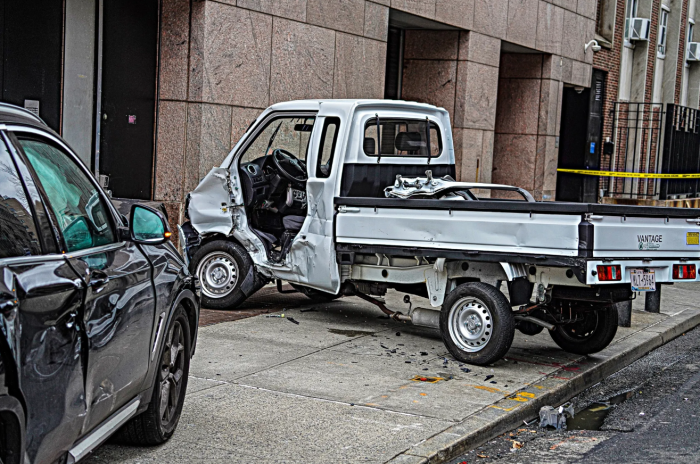
DOT is now in the position of joining crash victims’ families in pressing Albany to renew the city’s decades-old red light camera program, which the agency says has reduced red light running by 73% since 1994. The agency also wants to expand the program beyond the 1% of city intersections where cameras are legally allowed.
But allowing camera tickets to add points to one’s license, which could ultimately lead to suspension, is not such a simple endeavor, Gounardes says. That’s because speed cameras can’t determine whether the person a car is registered to is actually the one driving.
“If Andrew is driving Ben’s car and runs through a speed camera, there’s no way to know who is driving the car,” said Gounardes. “Because it only captures your license plate.”
On the other hand, when cops stop a motorist for a moving violation they can ask the driver for their license, as well as the car’s registration.
“I’ve looked at this and studied it, I think you’d need to change the entire camera program to identify who the driver is, and even then it would be really difficult to do it,” said Gounardes. “You might be able to devise a point system that attaches to every vehicle registered, but then you have a lot of folks who are running red lights or speed cameras who are registered in other states, so that’s also not perfect.”
The pain of a speeding death
But Juliane Williams, whose daughter Doniqueca “Niiqua” Cooke was killed by a speeding Porsche driver in June 2016, feels differently.
“Speed tickets should add points to a license,” said Williams, 55, the tenant association president at LeFrak City in Queens, near the site of the crash. “They should not wait until they have 100 or 1,000 speed tickets and yet no points are added to their license, they should be reprimanded the first occurrence.”

Cooke, then 21, was standing on a sidewalk of the Horace Harding Expressway’s access road, near Junction Boulevard in Rego Park, Queens, when the speeding driver of a Porsche jumped the curb and fatally struck her, also injuring another person before fleeing the scene.
The driver, Irene Lee, would be arrested and charged with leaving the scene of a crash. But the arrest didn’t fill the void in Williams’ heart left by the loss of her younger daughter, whom she described as the light of her life.
“We have something that can never be replaced, the life of our family members,” said Williams. “I don’t think the city understands or is doing enough to help those families or solve traffic violence.”
Williams feels that the status quo is allowing more and more families to become broken like hers, and contends government is not doing enough to address problematic driving. She is now a member of Families for Safe Streets, a support and advocacy group for crash victims’ families (members say it’s a club no one should want to join), and started a charity in her daughter’s honor, the NiiquaBee Faith Foundation.
But the pain of losing her daughter has never gone away.
“There’s nothing that can take away this pain,” she said. “Other than your child coming back in the world.”



